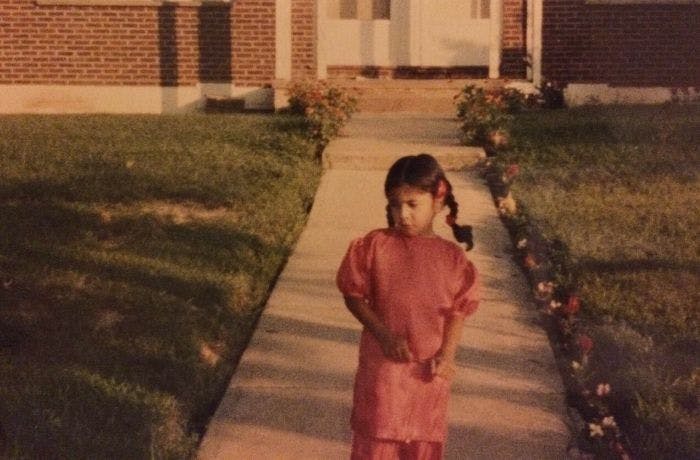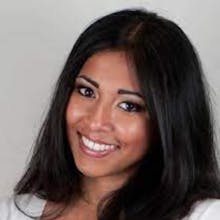Notes from “Saddam Hussein’s daughter” (no, not really)
by S. Nadia Hussain

The author at four years old in front of her home at the Fort Dix Army Base, New Jersey, wearing a traditional South Asian Salwar Kameez
I wish fear would never seep into my heart — the fear of something going terribly wrong, the fear that someone could hurt my child or take him away from me forever.
Though probably a normal part of the parenthood experience, it is heightened by the ever-present animosity in this country toward anyone deemed “not American enough.” It grows deeper when former friends post memes stating “All Muslims Are Terrorists.” It permeates me when at a rally in North Carolina I hear the familiar names of Deah Barakat, Razan Abu-Salha and Yusor Abu-Salha, three young American Muslims who were brutally gunned down a year ago in that state.
I feel the fear in my gut when Deah’s brother appears on stage pleading for people to stand up against bigotry and hatred.
It’s the feeling that strikes me instantly upon hearing of the recent murders of three young American Muslim men in Fort Wayne, Indiana. The media immediately speculates that this murder may be gang related, or a robbery, that it must be anything but a hate crime. I don’t know if it is a hate crime, but when that fear seeps back, I can’t help but ask myself the same nagging question.
Would they still be alive if they weren’t Muslim?
This fear makes me feel as if I’ve betrayed myself as an activist, as an American, and as a new mother. I feel like I’m giving in to the people spreading ugliness, cruelty and violence, both domestically and abroad.
When I think about my one-year-old son, with his pudgy cheeks, curious teardrop eyes and impeccably smooth light tan skin, I yearn to preserve his current experience of the world. I want to preserve his world without this fear and open hostility, open hostility that is based on the triviality of one’s perceived ethnicity or religious belief.
As our nation continues to transform into the most diverse society in human history, we are faced with a vicious backlash, a response to the unstoppable shift from a white majority. These movements need a target for their vitriol and hatred — and the more convenient the scapegoat, the better.
In the current presidential election season, Muslim bashing is celebrated, fueled by incidents of extremist violence in Paris and in my hometown of San Bernardino, California. Muslims may increasingly be the objects of negative attention, but this is hardly a new phenomenon.
Anti-Muslim sentiment has spiked in a post 9/11 world, but the dangerous stereotypes were present well before then. Certainly, they were present during my childhood.
Often, as the lone child of color, and certainly the lone South Asian and Muslim child in all-white elementary schools, the fact that I was ‘different’ was made very clear to me. Children can be teased and bullied for many reasons. In my case, it was because of my religion and culture. I was teased constantly for being the daughter of “Saddam Hussein,” for not being allowed to date, and for not celebrating Christmas. Christmas was a big deal in the small towns I lived in. During class pizza parties, teachers ordered pepperoni pizzas by default, apparently not once wondering if everyone in the class could eat pork or meat. I’d mournfully eat leftovers from lunch while everyone around me enjoyed hot, melted slices of my favorite food.
When watching movies, the bad guys were always brown and speaking jargon Arabic, indiscriminately shooting machine guns to try to destroy the hero white protagonists. Every single time. These may sound like small incidents but they added up. Here I was, born in the US with a father who served in both the US Army and National Guard Reserve, and yet, in the end, I was not white, not Christian, and therefore not American.
But I am American and I am raising an American son of mixed Salvadoran and Bangladeshi heritage. My husband converted to Islam and though he practices and I do not we both consider ourselves to be Muslim and are entangled in the same issues that are impacting this community around the country.
A friend of mine, also a person of American Muslim background, once told me “If we do not affiliate with the religion, we will be affiliated anyhow.” My child has a hyphenated last name and the ubiquitous “Hussain” is still there. I don’t know if he will be a practicing Muslim, but chances are that he will be affiliated with it regardless.
I recently assisted a mother whose daughter experienced a shocking incident of bigotry in her classroom when her teacher announced to her class of fourth graders that “Muslims are terrorists; look what they did in San Bernardino and Paris.” The daughter spoke up, insisting that she and her family were not terrorists, to which the teacher responded that they were fine but all other Muslims were suspect. This mother never spoke to her daughter about the incidents that had happened far away from them. She didn’t think it applied since they had nothing to do with extremism. Yet, no matter how hard she tried, these horrors found her anyway; there will always be people who insist on seeing a connection.
So how do we, as an American community, address this? How do I ensure that my son doesn’t grow up in a country and a world where being brown and being Muslim doesn’t automatically label him as an enemy and a threat?
I don’t have any easy answers. All I can do is work my hardest to demonstrate inclusiveness within my own life. I am deeply involved in social justice and political activism, embedding myself within the systems that govern our lives. I let people know that my family is what an American Muslim family looks like, because the truth is that we look like everyone!
Tokenizing and scapegoating people has led to the greatest tragedies in human history. We must all, Muslim and non-Muslim, stand together to understand one another, be in community and be visible together to spread the message that hating and marginalizing will not make anyone safer. It will not create a brighter future for our children.
I ask parents who feel discomfort about American Muslims to confront that feeling and challenge themselves to learn more about our community. Get to know us because we are part of the same neighborhoods, the same schools, and the same workplaces. We are all here to live the best lives for ourselves and for our families. I present the same challenge to American Muslim families that take refuge in cultural isolation. Be present in our democracy, be present with your whole community, not just with those from your own cultural background.
We must bridge this divide; otherwise, we cannot ensure a better future for the next generation. This may be an uphill battle, but hardly an impossible one. Every major demographic shift in the US has been met with anger and backlash. It is time for us to collectively break this pattern.
Enough is enough. Our children deserve a brighter and more inclusive future. We all do.
It is my hope that one day when my son is out there in the world without me, away from the safe spaces I created for him, that he will be seen for what he truly is.
An American.

S Nadia Hussain
Get Insights In your Inbox
Join our community and receive updates about our latest offerings - resources, events, learning groups, and news about all matters race and kids in the US.
Subscribe


